Note: This article was originally written in 2019, and has been recently updated to reflect current events and trends. Any updated information within the article was done by our fact-checker, Fawn.
Joining the US Army can turn into a rewarding career, with over 140 different job opportunities and retirement benefits that are hard to beat.
But what if you don’t want to go career military? What if you just want to serve for a few years and get out? What careers are available after that?
Whereas there are some common benefits awarded to all of those who serve, the following is a list of the best Army jobs that transfer over to civilian life.
All of these jobs are in demand in 2023 and can turn into a very well-paying career once your time in the service is up.
Related Article – Army MOS List: A List Of All 159 Army Jobs
Table of Contents
10 Best Army Jobs 2023
#10: Army Nurse (MOS 68C)
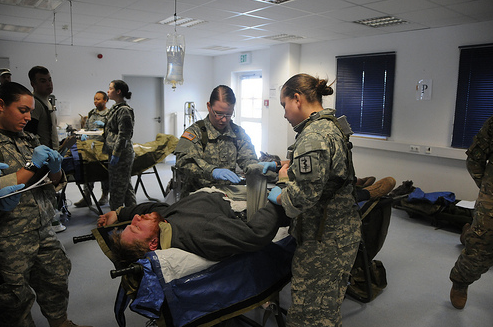
Becoming an Army Nurse is one of the most intellectually challenging jobs the Army has to offer, and that’s why Advanced Individual Training for 68Cs is a brutal 52 weeks long.
As an Army Nurse, you will have the rare opportunity to engage in your work both mentally and physically.
One day, you might find yourself taking blood at a major fort in the U.S., and the next you might be changing bandages on a small base in the mountains of Afghanistan.
One thing is for sure, you will get very good at calling in 9 line medevacs.
According to the Department of Labor, between the years 2016 and 2026, the need for Nurses is expected to grow 15%, much more than the national average. (1)
Related Article: Navy Corpsman – Everything You Wanted To Know
By taking advantage of the Partnership for Youth Success program, you can be set up with an employer immediately after you leave the service.
Median salary for nurses (2021): $77,600
Source: BLS.gov
#9: Air Traffic Control Operator (MOS 15Q)
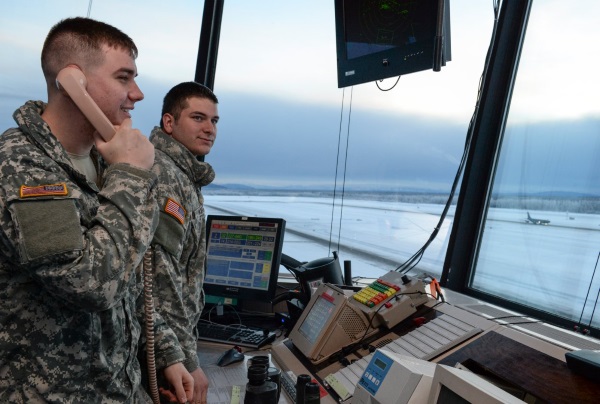
After a few years in the Army as an Air Traffic Control Operator, you can easily earn over $100,000 without any additional education.
Because of the potential consequences involved in 15Q’s job duties, an intense 15-week Advanced Individual Training takes place right after Basic Training.
Related Article: How Hard Is Army Basic Training?
The skills you’ll learn at that time include:
- Management and operations procedures
- Communications and radio familiarity, and
- Aircraft recognition.
Air Traffic Control Operators speak directly to the pilots, instructing them on safe takeoff and landing procedures.
They are the eyes and ears of landing strips and airports.
Although in practice the job is seemingly safe, if a 15Q messes up, the consequences can be disastrous.
Note that the Navy also has its own version of air traffic controllers as well.
About to get out of the Army as an Air Traffic Controller?
All you have to do is lose the uniform. Besides a few tips here and there, the duties performed by civilian Air Traffic Control Operators are virtually the same as the ones performed by those in the military.
Median Air Traffic Controller Salary: $132,250
Source: BLS.gov
#8: Wheeled Vehicle Mechanic (MOS 91B)
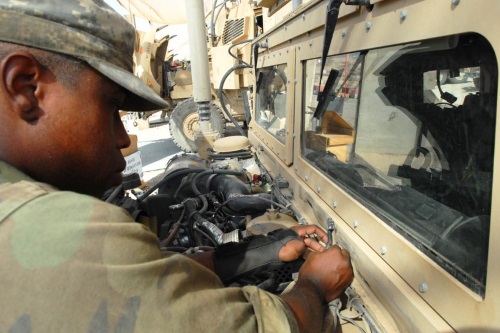
Wheeled Vehicle Mechanics make the list because there isn’t a city in America (or the world, for that matter) that doesn’t need a good mechanic.
In addition, while in the service it’s up to the mechanics to keep the troops moving.
Because the Army relies on wheeled vehicles for just about every major mission, Wheeled Vehicle Mechanics are vital to the Army’s success.
Another reason joining the Army as a 91B is a good idea is that the entrance requirements aren’t as daunting as some of the others on this list.
Whereas jobs like Cyber Ops Specialists require a combined entrance exam score of over 200, the combined score required by 91Bs is around 170.
Potential civilian employers for 91Bs include — well — just about any automotive shop out there!
Median automotive mechanic salary: $46,880
Source: BLS.gov
#7: Infantry (MOS 11B)
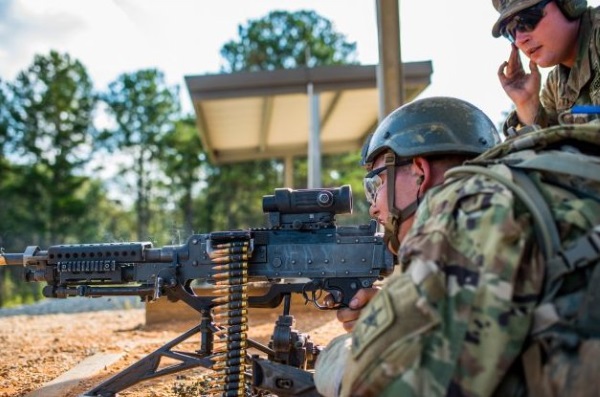
There’s an old saying in the Army that goes like this:
There’s 180 jobs in the Army, and 179 of them are support.
Infantry is on the list of top ten jobs in the Army for civilian life for reasons different than many of the other MOSs.
The infantry is like a brotherhood.
After you leave the service, even if you don’t plan on working as a private military contractor, simply having served in the infantry can land you a good job.
Many companies recognize infantrymen as natural leaders and people with go-getter attitudes.
Even further, if a potential employer sees Army Infantry on a resume and he himself was also infantry, there’s going to be an immediate sense of trust and camaraderie.
As far as practical applications go for what you’ll learn in the infantry, the actual civilian options are limited.
As previously mentioned, there’s private military contracting, such as Academi and KBR (among many others).
With that said, there are also city police, county sheriffs, state police, FBI, and more.
Average private military contractor salary: $15,000 – $22,500 PER MONTH
Source: Chron.com
#6: Technical Engineer (MOS 12T)
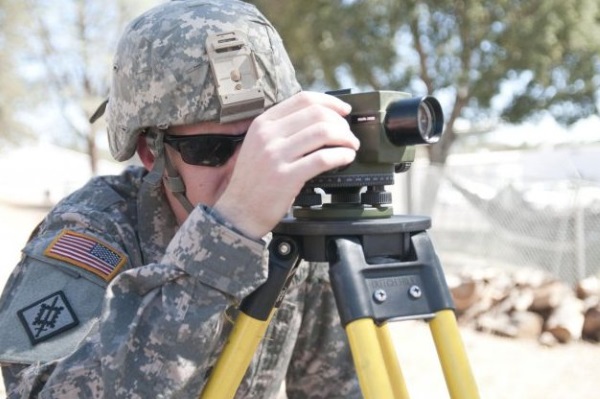
As an Army Technical Engineer, you’ll gain skills that will lead specifically to leadership roles in the civilian world of construction.
Army Technical Engineers investigate, survey, and draft plans for construction projects, similar to the duties of a construction site foreman or even an architect.
The duties a Technical Engineer performs are more stationary than the actual carpenters, plumbers, and general laborers.
A Technical Engineer will use computer programs to draft blueprints and even spend time in a lab analyzing materials.
Remember how I said mechanics make the list because they can find work virtually anywhere?
The same idea goes for Technical Engineers.
Anywhere there’s construction going on, there’s a demand for the skills a 12T has.
Army Technical Engineers need to be good at math and thinking about the big picture.
If you leave the Army as a 12T, consider getting higher education in architecture or engineering, or furthering your trade skills at a vocational school.
Median salary for construction foremen: $74,080
Source: BLS.gov
#5: Counterintelligence Agent (MOS 35L)
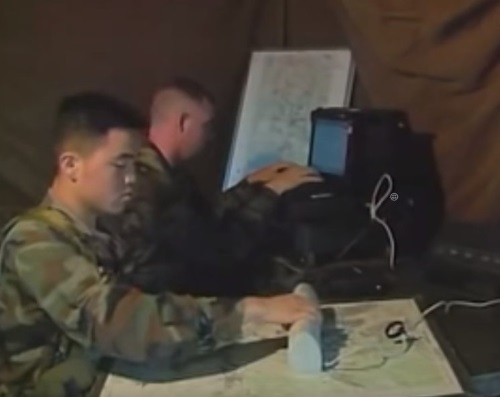
Aside from the fact that CI Agents get a badge, job duties for 35Ls are some of the most stimulating and interesting available in the Army.
Job locations include stateside and overseas assignments, and the duties vary from neutralizing threats to national security to analyzing forensic evidence.
Due to the classified nature of CI Agent’s work, potential agents must be eligible for Top Secret clearance.
In short, this means no federal arrests, no record of court-martials, and no history of emotional disorders.
Jobs after military service for CI Agents get really exciting.
If you’re thinking of one day joining the FBI, the CIA, the NSA, or similar private industries, counterintelligence agents would be the way to go.
Average CIA Agent Salary: $76,832
Source: ZipRecruiter
#4: Criminal Investigations Special Agent (MOS 31D)

If you’re thinking of pursuing a career in law enforcement after the military, then you definitely want to serve as a Criminal Investigations Special Agent.
As the title implies, CID Special Agents conduct investigations into felony-level charges involving the Army.
(Fun Fact: Lower than felony-level charges are investigated by the military police)
Because the investigations sometimes lead to charging military personnel, 31D’s act independently from most of the big Army operations.
You should know that there are a few catches to becoming a CID Special Agent:
- You have to already be in the Army and of the pay grade E-4 or above to join.
- You have to have 60 semester credits from an accredited institution.
- You have to have completed the Basic Leader Course.
A few years of service in the military police may be enough to get you a job in law enforcement at the local, county, or state level.
However, with “CID Special Agent” on your resume, it is likely that you can easily land a job in one of the more prestigious law enforcement institutions like the FBI, the Department of Homeland Security, or even the NSA.
Average FBI Agent Salary: $114,159
Source: Glassdoor.com
Note: The following jobs make the list because they are listed as “In-demand,” and therefore qualify for a special (as in, especially high) enlistment bonus.
#3: Bridge Crewmember (MOS 12C)
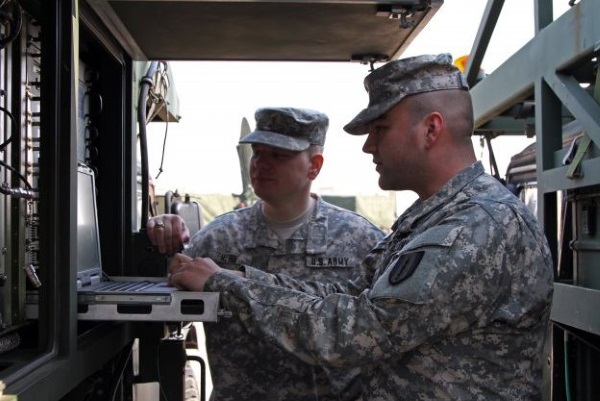
Bridge Crewmembers are eligible to earn a special enlistment bonus of up to $40,000. (2)
In addition, you’ll easily be set up for a successful career in construction after the military.
12Cs go through 14 weeks of Basic Combat Training and Advanced Individual Training.
Dealing with obstacles is key to success on the battlefield, and so 12Cs know how to get the troops from Point A to Point B, regardless of what is in the way.
After leaving the Army, a Bridge Crewmember can find work in a variety of fields, including many in the construction engineering and surveying fields.
There are a number of reputable companies that partner with the military looking to hire ex-25S’s, such as T-Mobile, Comcast, and CISCO Systems.
Median salary pay for a Surveyor: $63,080
Source: BLS.gov
#2: Visual Information Specialist (MOS 46V)

With a comfy bonus of $7,500, Visual Information Specialists work with audio and visual equipment to produce multimedia images.
These specialists normally work with Public Affairs and PsyOpps, producing graphics, animation, and video to support critical messaging goals.
46Vs go through a highly demanding 34 weeks of Advanced Individual Training immediately after Basic training. Once they graduate, the skills they’ll gain will include:
- The ability to create informative videos.
- The know-how to develop websites and web pages.
- A deep familiarization with editing software for images and video.
Just as there’s a high demand for Visual Information Specialists in the Army, the civilian world is seeking them, too.
Life after the service as a 46V can lead to a productive career in journalism, radio, broadcasting, content creation, advertising, and marketing.
Furthermore, top tech companies are always seeking people with the skills that 46Vs; companies like Apple, Facebook, and Google.
Median salary for Film and Video Editors: $60,360
Source: BLS.gov
#1: Cyber Operations Specialist (MOS 17C)
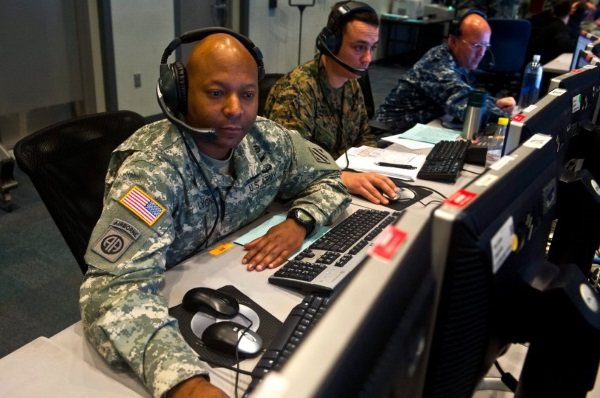
If the Infantry is at the frontline of war on the ground, then Cyber Operations Specialists are the first to fight in the digital world.
In the most exciting times, Cyber Ops Specialists work hard to lead defensive and offensive operations that serve the US military’s cyberspace domain.
However, on a regular day, 17Cs work as the IT guys of the Army.
They are computer experts, maintaining vital firewalls and securing routers in case of security breaches.
Related Article – Army Cyberspace Operations Officer: Pay, Training, And More
Training for Cyber Ops Specialists is long and highly technical. After Basic Training, 17Cs spend a total of 45 weeks learning coding and hacking procedures.
It should go without saying that Army Cyber Operations Specialists are set up for competitive, high-paying jobs once they leave the service.
Federal departments such as the FBI, the CIA, and the NSA are always looking to hire 17Cs, as well as privately-owned businesses, such as Lockheed Martin and Northrop Grumman Corporation.
Average Cyber Ops Specialist salary: $102,600
Source: BLS.gov
Conclusion
So, there you have it. Those are the top 10 Army jobs for civilian life. While there are many potentially great careers in all branches of the military, these 10 really stand out.
Thinking about your time after the service is actually one of the most important things you should do before deciding on a branch to serve in.
Related Article: Which Branch Of The Military Should I Join? 7 Things To Consider
Hopefully, this article will have given you some guidance in that regard.
As a final note, there’s no better guarantee that your life will be successful after the Army than taking advantage of the military’s generous education benefits.
We’ll be posting an article on that soon, so stay tuned!
Related Articles
Army APFT Test Standards For Males and Females
- Green Berets Vs. Rangers: 5 Major Differences - June 17, 2024
- Tattoo Policy For Each Branch Of The Military In 2023 - June 17, 2024
- Top 20 Reasons To Join The Military (and 7 Reasons NOT To) - June 17, 2024

